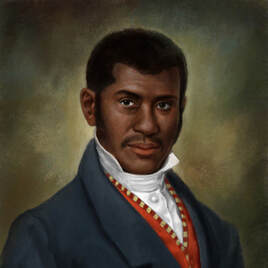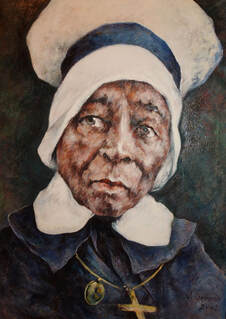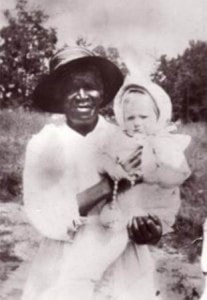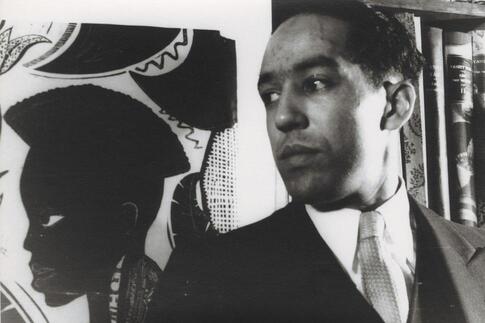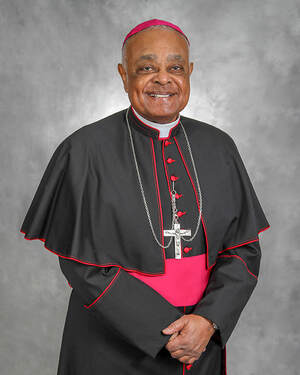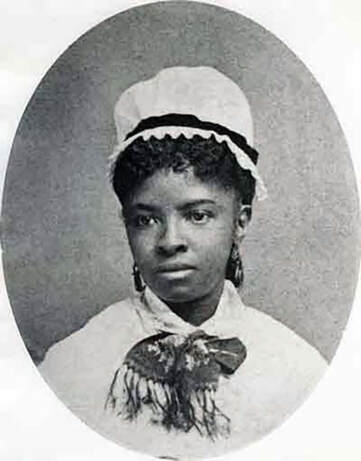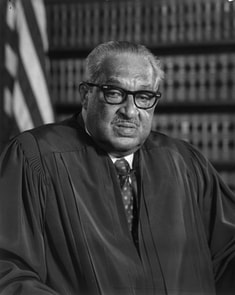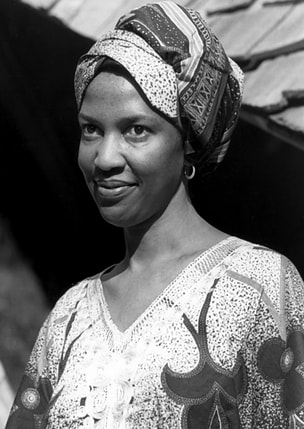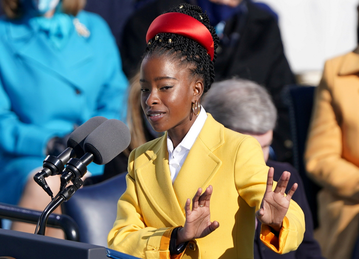Black History Month
In honor of Black History Month, St. Joseph’s Workers4Justice are sharing short biographies and quotes from Black and African American figures, with a focus on Black Catholics and their contributions to the Catholic spiritual and intellectual traditions and social doctrines.
This page will be updated a couple times a week during the month of February. Please, return often!
Update (2/28/2021): We encourage you to explore the Black Catholics Syllabus, compiled by Dr. Pratt. "This syllabus is a collection of resources related to Black Catholics in the United States. It is intended for academics, journalists, educators, diocesan institutions, parishes, congregations of women and men religious, and the general public. This syllabus prioritizes the work of Blacks in order to center the voice of Black Catholics in the creation of their own narrative."
This page will be updated a couple times a week during the month of February. Please, return often!
Update (2/28/2021): We encourage you to explore the Black Catholics Syllabus, compiled by Dr. Pratt. "This syllabus is a collection of resources related to Black Catholics in the United States. It is intended for academics, journalists, educators, diocesan institutions, parishes, congregations of women and men religious, and the general public. This syllabus prioritizes the work of Blacks in order to center the voice of Black Catholics in the creation of their own narrative."
Dr. Rebecca Lee Crumpler Dr. Crumpler was the first African-American woman physician in the United States. Born in 1831, Dr. Crumpler first worked as a nurse in Massachusetts between 1852 and 1860. She was accepted to New England Female Medical College and earned an M.D. in 1864. She practiced medicine in Boston and Richmond, Virginia, primarily working with the poor, who had limited access to medical care. In 1883, Dr. Crumpler published a renowned book, Book of Medical Discourses In Two Parts, which many believe is the first medical text written by an African-American author. Dr. Crumpler practiced in Boston, but then moved to Richmond after the Civil War. There, she noted that "the last quarter of the year 1866, I was enabled . . . to have access each day to a very large number of the indigent, and others of different classes, in a population of over 30,000 colored." She joined other black physicians caring for freed slaves who would otherwise have had no access to medical care, working with the Freedmen's Bureau, and missionary and community groups, even though black physicians experienced intense racism working in the postwar South. "At the close of my services in that city," she explained, "I returned to my former home, Boston, where I entered into the work with renewed vigor, practicing outside, and receiving children in the house for treatment; regardless, in a measure, of remuneration." Learn more about Dr. Crumpler here.
Thurgood Marshall (1908-1993)Thurgood Marshall was an American lawyer and civil rights activist who served as Associate Justice of the Supreme Court of the United States from October 1967 until October 1991. Appointed by President Lyndon B. Johnson, Marshall was the Court's first African-American justice. Marshall graduated from the Howard University School of Law in 1933 and established a private legal practice in Baltimore before founding the NAACP Legal Defense and Educational Fund, where he served as executive director. Prior to his judicial service, he successfully argued several cases before the Supreme Court, including Brown v. Board of Education, which was a landmark decision of the U.S. Supreme Court that ended state laws requiring school segregation (although in large part because of residential segregation, schools remain nearly just as or more segregated now). Learn more about Thurgood Marshall here.
Servant of God, Sister Thea Bowman, F.S.P.A. (1937-90)God is present in everything. In the universe in creation, in me and all that happens to me, in my brothers and sisters, in the church - everywhere. -Thea Bowman, FSPA
Thea Bowman was a Franciscan Sister of Perpetual Adoration and was given the title “Servant of God” in 2018, which is the first step in the process of canonization. She was born December 29, 1937, in Yazoo City, Mississippi and died March 30, 1990 at the age of 52 of cancer. Inspired by the actions of the women religious and priests at her school, she became a Catholic when still a young girl. At 15 she joined the F.S.P.A, becoming the order’s first Black member. She earned a doctorate from the Catholic University of America in 1972 and was a founding member of the Institute for Black Catholic Studies at Xavier University in New Orleans. A teacher, singer, writer and evangelizer, she delivered public lectures across the country as a sharp critic of racism. She helped found the National Black Sisters Conference to provide support for African-American women who are Catholic Sisters or Nuns. She sang, wrote, taught, danced, and shared God’s love. Learn more about Thea Bowman at the official canonization page.
|
Venerable Pierre Toussaint (1766-1853)
The Venerable Pierre Toussaint was born under enslavement in Haiti. In 1787 during the Haitian revolution, he came to New York with the family that held him as an enslaved person. Once free, he became a successful hairdresser. Venerable Toussaint, whose surname is in honor of the hero of the Haitian Revolution (Toussaint Louverture), is credited with being the father of Catholic Charities in New York; he was a formidable fundraiser especially in support of Black Catholics. Pierre was instrumental in raising funds for the first Catholic orphanage and began the city’s first school for Black children. During a Yellow Fever epidemic when many of the city’s political leaders fled the city in search of healthier rural climates, Pierre Toussaint cared for the sick and the dying. For more information, visit this page.
Mary Elizabeth Lange, O.S.P. (circa 1784-1882)After fleeing the revolution in her native Haiti with her family to Cuba, Mother Lange moved to Baltimore, Md., in 1813 with money she received from her merchant father. There she used her wealth to provide free schooling to Caribbean migrant children at a time when it was illegal for enslaved people to receive an education. Following Emancipation, she opened a school for girls of color in 1828 and asked permission to establish a religious congregation for Black Catholic women. When the Oblate Sisters of Providence were founded in 1829, Mother Lange served as its first provincial superior. The sisters educated Black children and illiterate adults, cared for widows and orphans and offered succor to many people during the cholera epidemic of the 1830s and ’40s (taken from America Magazine). To learn more about Mother Lange, visit the site dedicated to her canonization cause.
Julia Greeley, O.F.S. (d. 1918)Julia Greeley was born into slavery in Missouri where she was blinded in one eye while being beaten by a slave owner. After being freed by Missouri's Emancipation Proclamation, she found her way to Denver, Colorado where she later became Catholic and devoted her life to caring for the poor with a particular heart for children. She would deliver food, clothes, and necessities to the needy under the cover of the darkness of night so that the poor would not be embarrassed by a black woman helping them. She died in 1918 on the feast day of the Sacred Heart which was meaningful because she was baptized at Sacred Heart Church and dedicated her life to this devotion.
She is known as "Denver's Angel of Charity". In 2016 the steps were initiated to begin consideration for her canonization. Learn more here, here, or here. James Mercer Langston Hughes (1901–1967)Oh, God of Dust and Rainbows, Help us to see That without the dust the rainbow Would not be. -Langston Hughes
The great American poet, social activist, novelist, and playwright, James Mercer Langston Hughes was born February 1, 1902, in Joplin, Missouri. As a child he moved to several small towns in the midwest and plains. During high school he began writing poems, articles, and plays. He lived with his father in Mexico for a year after high school and then spent a year at Columbia University in New York City. He left Columbia because of its racism. He spent three years traveling in Africa, Europe, and the United States before attending Lincoln University, a historically Black College in Chester Pennsylvania. Hughes was one of the few prominent Black writers of his time to champion racial consciousness as a source of inspiration for Black artists. Over the course of his life Hughes wrote hundreds of poems, books, plays and articles, started acting troupes and organizations and won dozens of awards. The quote is a little deceptive, perhaps: Hughes was a humanist whose writings betray a sharp critique of belief in God and religion. Learn more about Hughes here. Wilton Cardinal GregoryA native of Chicago, Wilton Gregory converted to Catholicism at a young age and became an ordained priest in the Archdiocese of Chicago in 1973. After ascending through the ranks all the way to Archbishop over the subsequent decades, on November 28th 2020 Gregory was appointed by Pope Francis to the College of Cardinals, becoming the first Black American Cardinal in Catholic history. Over the years Wilton Cardinal Gregory has served in a leadership role for the U.S. Catholic Church. In the early 2000s as President of the U.S. Conference of Catholic Bishops he led the zero-tolerance policy adoption towards priests guilty of sexual abuse, and recently he has strongly advocated for better race relations within the Church.
Learn more about Cardinal Gregory here (NYTIMES) or here (Archdiocese website) |
|
ST. JOSEPH CATHOLIC CHURCH
767 Prospect Street Maplewood, NJ 07040 973-761-5933 Fr. Jim Worth Pastor [email protected] WEEKEND MASS SCHEDULE Saturday Vigil: 5:00pm Sunday: 9:00am & 11:30am WEEKDAY MASS SCHEDULE Mon-Fri: 8:00am |

